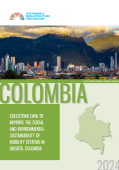
The case study details the innovative approaches taken by Bogotá, Colombia, to address the challenges of urbanization, congestion, and pollution through data-driven strategies for sustainable infrastructure.
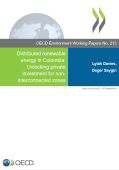
Building on international experiences, this paper discusses approaches to strengthening investment conditions, looking at support mechanisms and de-risking instruments used elsewhere, which can help bridge the financing gap in Colombia.

Colombia’s largest marsh ecosystem, the Ciénaga Grande de Santa Marta (CGSM), has experienced substantial erosion since the 1950s, when a highway was constructed along Salamanca Island. The Government of Colombia has proposed to refurbish and expand the highway to make it more resilient to coastal erosion and sea level rise, and to accommodate increased vehicle traffic. The proposal was a conventional “gray” design.
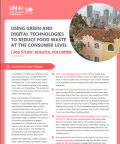
This case study is about using green and digital technologies for reducing food waste in Bogota, Colombia.
The report features how strategic spatial planning can be used to gain new insights of opportunities and constraints for mining-dependent regions and to develop multi-sectoral development plans for resilient and sustainable economies.
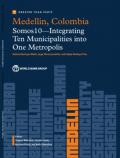
The main objective of this report is to understand how a variety of developing and emerging economies are successfully utilizing horizontal integration—across multiple infrastructure sectors and systems—at the metropolitan scale to deliver greater sustainability. This report explores how integrated planning processes extending well beyond city boundaries have been financed and implemented in a diverse group of metropolitan areas.
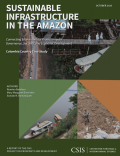
The case study lays out the challenges and opportunities for Colombia, exploring the connection between deforestation and security, governance, and infrastructure development and the implications for stabilization in Colombia.
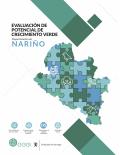
The Green Growth Potential Assessment (GGPA) is a diagnostic tool developed by the Global Green Growth Institute (GGGI) that consists of a combination of data analysis and stakeholder consultation in order to identify and prioritise a country’s opportunities for green growth. This report presents the findings of the GGPA process for Colombia.
This case study brings together the achievements, challenges, and lessons from the first five Wealth Accounting and the Evaluation of Ecosystems Services (WAVES) countries—Botswana, Colombia, Costa Rica, Madagascar, and the Philippines. The WAVES Partnership Program promotes the global implementation of natural capital accounting (NCA), which has included work to institutionalize NCA in a group of countries through a program of extensive, long-term technical support.
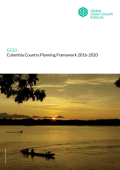
This Country Planning Framework (CPF) sets the strategic direction for the Global Green Growth Institute (GGGI) in Colombia over the period 2016-2020.
